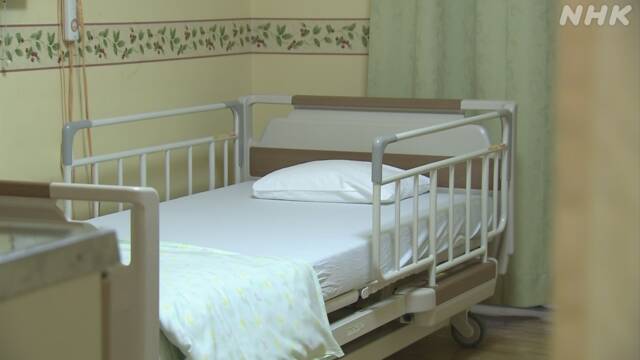A council in Tokyo conducted a questionnaire survey on the impact of the seventh wave of the new coronavirus on facilities for the elderly, and found that many users of residential facilities could not be admitted to medical institutions even if they were infected. I understand.
The council says that many users are recuperating in the facility, and it has emerged that it is difficult to prevent the spread of infection.
In September, the Tokyo Council of Welfare Facilities for the Elderly conducted an online survey of facilities for the elderly in Tokyo, and 273 facilities, or 47% of the total, responded to in-home facilities such as special nursing homes for the elderly. Did.
According to this, the total number of facility users infected with the new corona in the two months from July 1st was 1795 at 159 facilities, while the number of staff infected was 1489 at 155 facilities. I see that the infection has spread among people and among officials.
In addition, while 299 of the infected users were able to be hospitalized in medical institutions, the number of users who could not be hospitalized despite adjustments made by the public health center reached 570, nearly double that number. rice field.
In addition, when asked about problems with infection response with multiple answers, 135 facilities, which had the largest number, cited "securing staff," followed by 103 facilities, which cited "cannot be hospitalized."
In addition, 95 facilities, or 30% of the respondents, said that clusters occurred, and the reason why clusters are likely to occur is that it is difficult for users to take measures against infection themselves.
Regarding this result, Tetsuya Tsuruoka, vice chairman of the Tokyo Council of Elderly Welfare Facilities, said, "In the 7th wave, there are many residents who cannot be hospitalized and have to recuperate in the facility, and it is difficult to prevent the spread of infection. "The actual situation has become clear. Assuming such a situation, it will be important to ensure that staff members can take infection control measures above a certain level through training, etc., and create a system that can bring the situation under control as quickly as possible." I'm here.
“Even if measures are taken, it is difficult to completely prevent the spread of infection”
With the 7th wave of the new coronavirus, a special nursing home in Tama City, Tokyo faced a situation where it was difficult to prevent the spread of infection within the facility even if measures were taken.
At this facility, on August 1, it was confirmed that three residents were infected with the new corona.
For this reason, we took measures to prevent infection called ``zoning'' by partitioning this floor with a fire door to separate the living space of infected people and close contacts from those of other people.
However, by August 16, the number of infected residents on this floor had increased to 24, forming a cluster.
On the other hand, we coordinated with the public health center to admit the infected residents to a medical institution, but only three people could be hospitalized because the medical institution was tight.
At the same time, seven nursing care workers on this floor were infected, and some of them were unable to go to work one after another.
After that, the number of infected people did not increase, and on September 2, the last one of the residents completed the follow-up period, but the facility did not prevent the spread of infection within the facility even if measures were taken to prevent infection through the 7th wave. It means that I realized that it is difficult to cut.
Tetsuya Tsuruoka, director of Hakurakuso, a special nursing home for the elderly, said, "The initial response is very important, and it's important to be prepared to receive treatment in the facility and to quickly bring the infection under control without spreading it." I'm here.

